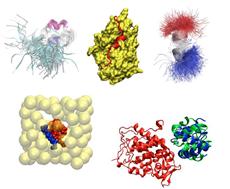Jul 25 2013
A Lehigh chemical engineer who favors biological molecules like proteins and DNA over chemicals and who proudly claims “my students do all the work,” has won the prestigious Allan P. Colburn Award from the American Institute of Chemical Engineers (AIChE).
 Jeetain Mittal and his students create computer models of protein structure and dynamics. Improper protein folding, says Mittal, can lead to such diseases as diabetes and Alzheimer’s.
Jeetain Mittal and his students create computer models of protein structure and dynamics. Improper protein folding, says Mittal, can lead to such diseases as diabetes and Alzheimer’s.
Jeetain Mittal, assistant professor of chemical engineering and director of the Biophysics and Soft Matter Group, was honored for his early-career efforts in simulating and predicting the behavior of biomolecules at interfaces.
The Colburn Award, one of the most coveted for young chemical engineers nationally, “encourages excellence in publications by a younger member of the Institute.”
The award will be presented at the 2013 annual meeting of the AIChE in November in San Francisco. AIChE, the leading international organization for chemical engineers, has more than 45,000 members worldwide.
Simulating protein dynamics
So how does a chemical engineer avoid test tubes and toxic chemicals?
The answer is computer simulation. Mittal and his team create models that help predict how proteins are structured, how they behave when pushed and poked in a crowded environment (like a living being) and how they sometimes misbehave by folding improperly, causing diseases like Type 2 diabetes or Alzheimer’s.
It takes just a few milliseconds for a nanoscale protein chain to fold into the 3-D shape that controls its behavior—making lab analysis complicated, time-consuming and expensive. Traditional lab experiments on protein behavior within complex, living environments are, therefore, neither simple nor accurate.
In the simplest of terms, Mittal is trying to create an extremely accurate computer model of protein structure and dynamics. It is believed that hydrophobic interactions (between water-repelling amino acids) are the driving force of protein structure formation. Therefore, if the model of water is not accurate then there is no ability to predict the properties of proteins accurately either.
Currently used computer water models in protein simulation—the ones that Mittal and a small handful of researchers around the world are trying to improve—are limited, describing only few aspects at a time, like solubility or boiling point.
Mittal and his students are attempting to create a protein model that encompasses all aspects of water. The more accurate the resulting model, the more accurate his research results will be.
“The prospect of modeling the behavior of water is not new,” says Mittal. “Researchers have been approximating its behavior in computer simulations for decades. The problem there is that the number of models describing the behavior of water is almost limitless.
“Not only are there many different choices to start from, but water can actually behave very differently depending on small differences in the system you study. If you add something into the water—even a small protein or a solute—water rearranges around it and does a lot of things.”
Mittal’s research into intrinsically disordered proteins and the three-dimensional structure of proteins has been reported in Resolve: A Focus on Lehigh Engineering, a twice-yearly publication of Lehigh’s P.C. Rossin College of Engineering and Applied Science.
In being chosen for the Colburn Award, Mittal stands in good company: Lehigh President Alice P. Gast was honored with the same prize in 1992 while at Stanford University.
Allan P. Colburn, for whom the award is named, was a pioneer in the field of chemical engineering and one of the first 20 Americans to earn a doctorate in the field in 1929. He worked for DuPont and the University of Delaware, forging a relationship and providing a template that continues to this day between private enterprise and academia.
Despite receiving an award for career work, Mittal is not ready to call it quits. “To be honest, it’s just the beginning,” he said. “I’m enjoying the journey and that’s what I’ll continue to look for.”